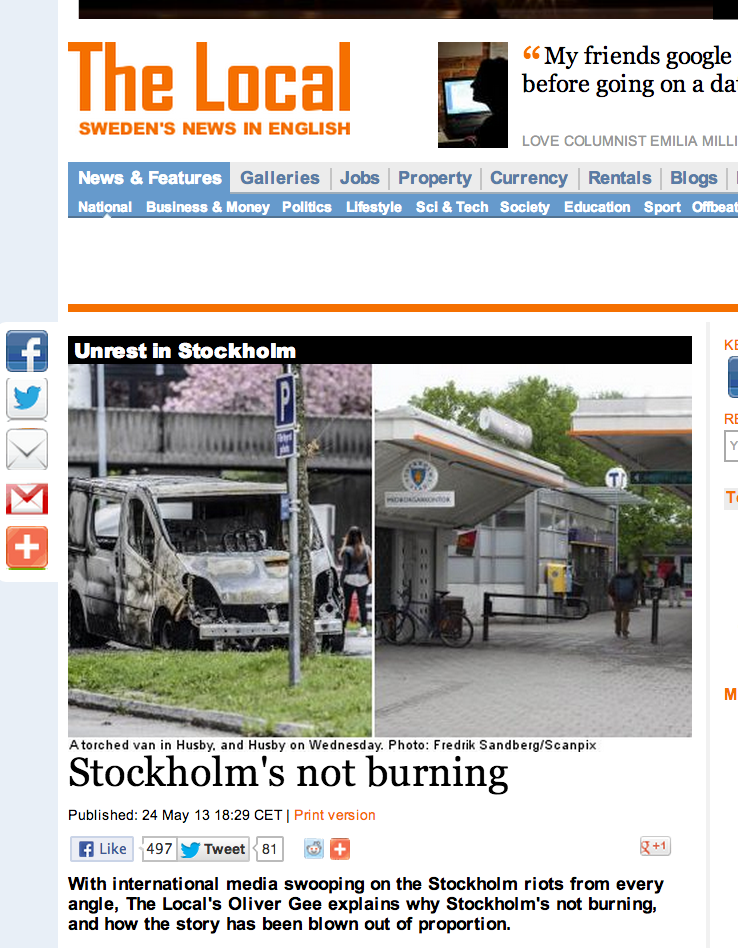Apart from being a wake-up call to ever-growing social exclusion, discrimination and outright intolerance that is alive and kicking in Sweden, the riots in the northern suburb of Stockholm have revealed in Finland our prejudices and loathing for cultural diversity.
The Local writes: “Stockholm is not on fire. Let’s get that clear immediately.” Read full story here.
The riots in Husby even encouraged anti-immigration commentators on Migrant Tales to radicalize and step up their attacks on those who defend the good name of this blog.
Since riots are a desperate call for attention, reaction to such turmoil can reveal our deepest fears, prejudices and shameless doses of political opportunism as we have seen by Perussuomalaiset party politicians.
For me, the riots in Sweden are a sad reminder that a part of our society is still incapable of coming to terms with cultural diversity. Their response is defensive instead of proactive.
What does all of this reveal to us? That the lives of certain immigrant groups in this country are going to get far worse in the future.
By ”far worse” I mean greater social exclusion, prejudice and discrimination. Instead of finding proactive solutions, our prejudices will continue to cripple and impair our good judgement.
Another unsettling fact emerges from the Stockholm riots: Finland has serious issues of its own in accepting its ever-growing cultural diversity.
What will all of this lead to? The answer is simple: Similar riots in Finland in the future as in Sweden.
If the riots in Husby show that that a model Nordic welfare state like Sweden has issues concerning cultural diversity, it suggests that matters in Finland are in far worse shape.
It’s not too late, however. A lot can be done to avoid the mistakes of Sweden on the integration of immigrants front.
The most important of these is to live up to the spirit of our laws, which promotion of acceptance, opportunities and social equality for all.


So you are basically saying that the riots are everyone elses fault than the fault of rioters and the organizers of the riot (including Megafonen, which ironically is backed by the state)? This isnt because of discrimination from the majority, this isnt because of prejudice. Maybe social exclusion, in the way that 80% of residents in Husby are immigrants or have immigrant backgrounds.
This is nothing else than a show of power and hate from the rioters. They hate the state of sweden and think of it as a joke.
–This is nothing else than a show of power and hate from the rioters.
That’s your opinion and a pretty narrow one at that. So you think people protest just for the sack of protesting, right?
If you read a recent report by The Local, it claims that the riots have been blown out of proportion. The English-language paper claims that “Stockholm isn’t burning.” Here’s the link: http://www.thelocal.se/48126/20130524/
They dont have any clear demands, i dont see this as protesting. More like vandalism. id say they riot because they hate the swedish authorities and see them as their enemies. and now they got a good chance to riot.
–id say they riot because they hate the swedish authorities and see them as their enemies. and now they got a good chance to riot.
If that is the case, then it means the Swedish authorities have a problem. If the police are seen as an enemy then it’s bad public relations by the police. They’re not doing their job well enough. Restoring credibility is difficult but not impossible. You need to acknowledge the problem to start with.
I dont think that swedish police has brutal or unprofessional manners, especially when compared to the police force of most european states. In your opinion its not possible in any way, that the rioters themselves have a problem?
Afaik they havent even voiced any protest except for stuff such as “fuck the cops ACAB”.
Jssk
Similar sentiments were expressed concerning the Finnish police in the mid-1980s, but the experience of foreigners in Finland at this time was that the police showed very considerable lack of feeling and a clear lack of professionalism when issuing fundamental administrative decisions. The bad reputation of the Ministry of the Interior police bureau aliens office was fully deserved, as successive scathing decisions of the Parliamentary Ombudsman made clear at the time.
This lack of professionalism included a thoroughgoing contempt for basic principles of administrative law, such as hearing the concerned party and providing objective justifications for decisions. On several occasions we saw police officers “explaining the grounds” for a decision by merely repeating the process and its outcome: “the applicant requested X, the police did not grant X, the reason for not granting X is that the application was refused”. We should remember that “X” in this kind of case could be the question of a person’s liberty, opportunity to live with family members, or prospects of escape from an abusive employer or spouse.
Systematic unprofessionalism of this kind has a lasting effect on relations between the police and immigrant communities, and we can still see the effects of it in various generations of immigrants in Finland. Successive administrative and legal reforms in and around the 1990s slowly improved the situation, but the system has only really been fair and reasonable since the 2004 Aliens Act, though we still hear occasional complaints from old school police officers when their (illegal) decisions are overturned on appeal.